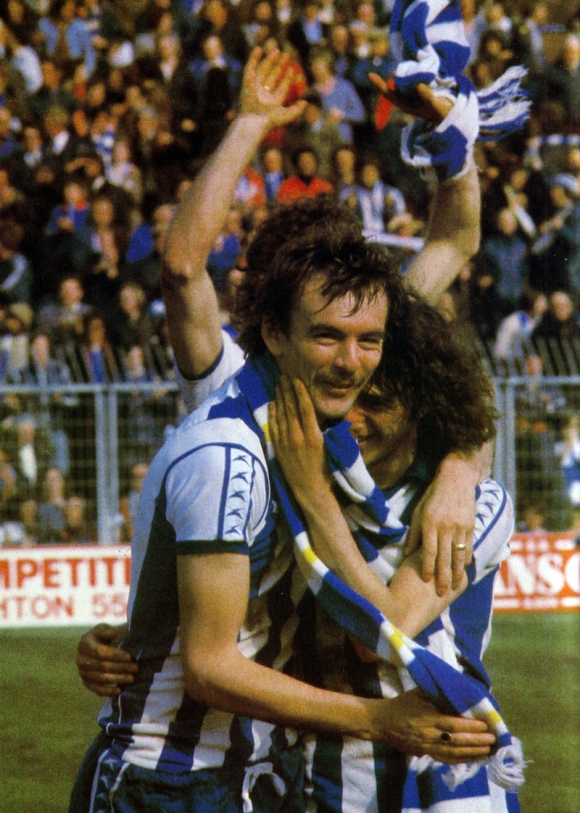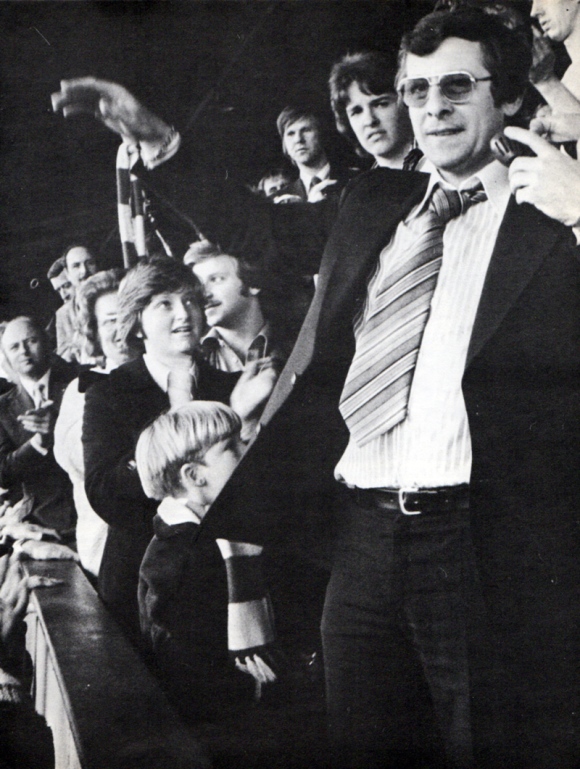In Part 60 of Marshall Cavendish’s ‘Football Handbook’ in the late 1970s, there is a superb account of Brighton’s First Division debut against Arsenal on the opening day of the 1979/80 season:
From the Fourth Division to the First in 14 years – that’s the Brighton & Hove Albion success story. Handbook went behind the scenes for Brighton’s baptism of fire against FA Cup holders Arsenal, and discovered how nerves and lack of experience played a big part in the Seagulls’ day-one disaster…
August 18, 1979 should have been the greatest day in Brighton & Hove Albion’s history–their first match ever in Division One. Unfortunately, Arsenal were to spoil the celebrations…
Before the match the team meets in the usual hotel. The old brigade who clinched promotion for Brighton chat noisily, while the new boys – like John Gregory, bought in the summer from Villa – smile nervously on the edge of it all.
Peter Ward sits alone and bleary-eyed. He has been up all night while his wife gave birth to their second daughter.
There’s a studied air of calm about the Brighton squad, but the prospect of making their First Division debuts has several of them inwardly buckling with nerves.
This, and the fact that FA Cup holders Arsenal are the visitors, has given everyone the flutters. All the Gunners’ players are familiar to the Brighton lads. Arsenal receive enough press exposure and TV coverage for a team-talk to be almost unnecessary. Alan Mullery concentrates on morale.
‘They’ve only got two feet, same as you. They might pass the ball better than Second Division sides, but they also let teams play which Second Division teams don’t do. We’re not going to respect anyone in this League – we’re going to chase, fight and tackle.’
Mullery to Maybank: ‘Ted, I want you back in our area for corners. I don’t care how tired you are, you’ve got to get back to knock that ball away with your head.’
Before they board the coach that will take them to the Goldstone Ground, Mullery tries one last piece of basic psychology. ‘Now listen. We know them, but I’ve just been talking to their physio, Fred Street, and they haven’t a clue what to expect from us.
‘You beat Arsenal today and you’ll believe in yourselves for the rest of the season.’
As the coach nears the ground, the jitters begin to surface again. Maybank senses the mood and tries to defuse it with a joke. ‘Don’t panic, don’t panic,’ comes his Corporal Jones impersonation from the back of the bus.

“Hello, hello, grannie aggro’? The arrival of First Division football in the Sussex town captures the imagination of everyone – young and old
Inside the ground, the atmosphere is electric: a pipe and drum band march past the brand new stand, and then the Albion players emerge in their ‘civvies’ to walk around the pitch and acknowledge the fans’ tumultuous applause.

Striking up the band… Alan Mullery salutes the Goldstone crowd before the match. Despite their vociferous support, Albion failed to deliver any points on their big day.
Ten minutes later they re-emerge. This time it’s for real – and within minutes Brighton’s First Division career has begun. After 60 seconds Talbot and Horton tangle and the free-kick to Albion bobbles tantalisingly around the Arsenal box. Ryan latches on to it, wriggles through and swivels to send in a left-footer which the shovel-sized hands of Jennings tip away at full stretch.
Three minutes later it’s Ryan again. This time the toe-end of Willie Young’s despairing lunge relieves the pressure. The Brighton crowd scream their support. Although Ryan yet again comes close, Arsenal are starting to settle. Their offside trap is beginning to frustrate Mullery’s men and, ominously, the Rix-Brady shuttle service is starting to roll down the left.

Malcolm Poskett, who came on for the injured Teddy Maybank, finds out what it’s like to trail a world-class player – Liam Brady. It’s all afar cry from Brighton’ s Second and Third Division days…
Then, inside the space often bewildering minutes, Brighton’s dreams come crashing down around them. First Stapleton receives from Sunderland to crash a 20-yarder past Eric Steele; before Brighton have time to reflect on the seeming injustice of it all, Arsenal make it two – from Brady’s freekick, Young’s header drops to Sunderland, who nods in from a yard out.

Albion skipper Brian Horton goes into the book after a clash with Talbot, who was also involved in several incidents.
By half-time Brighton are dead. Rix lofts a pass through the middle. Sunderland delays his run and then sprints past Rollings and scoops the ball over Steele. The keeper gets a palm to it but the ball still drops into the net; 0-3.
As Albion troop in disconsolately at the break, Mullery tells them, ‘You’ve lost the game. Now get out there and start again with a clean slate…’
But it’s all gone flat. Only the jigging of the Arsenal contingent breaks the silence as they mimic the ‘Sea-gulls’ chant with one of ‘Three goals, three goals’. And then a Brady penalty makes it four in the second half to really rub Brighton’s noses in it.
As Brighton file sadly into the dressing-room at the end, their big day ruined, Terry Neill comments, ‘We posed them a few more problems than they’re used to. But I’m sure Alan Mullery is not the type of individual to get discouraged.’
Though bitterly disappointed, Mullery still finds time to praise Arsenal and pinpoint the difference between the sides. ‘They taught us a lesson in cold, clinical finishing,’ he says.
‘It was like a Clint Eastwood movie. Out came the guns, and bang bang – we were dead…’
Under the title ‘Frank’s zapper’, Football Handbook then turned its attention to Frank Stapleton’s goal:
The most meaningful lessons are usually the most painful to learn – in life, in football.
For Brighton and Hove Albion the moment of truth came on the opening day of the season, their first-ever First Division contest.
FA Cup winners Arsenal were the visitors.., and the teachers.
All the exuberance that took Brighton to promotion hardly dented the composure of silky Arsenal, to whom First Division pressure was nothing new.
Manager Mullery’s ‘treat it like a cup tie’ approach – ‘we’re going to chase, fight and tackle’ – lost all significance once Arsenal took the lead approaching half-time.
Brighton had had most of the play and, like an underdog boxer, must have fancied their chances of an upset.
And, like many a ‘softener’ for the knock-out blows to follow, the goal that put them firmly in their place had an almost dream-like essence to it.
Inertia ruled among the Brighton players as Sammy Nelson played the ball down the left to Alan Sunderland.
He was given space to cross where he liked and almost certainly aimed deep for Brian Talbot, who had made a typical run behind the home defence.
His mishit went straight to Stapleton instead. Stapleton stumbled. The crowd laughed. Stapleton recovered but his shot from 20 yards was hardly a hammer blow.
Nevertheless, it went in, the ball looping over the despairing Eric Steele.
If that was a dream-like moment, it soon became a nightmare as Arsenal added two more quick goals before half-time.
In the end it was a humiliating 0-4 scoreline, a result that Mullery rightly saw as a lesson in cold, clinical finishing.

























